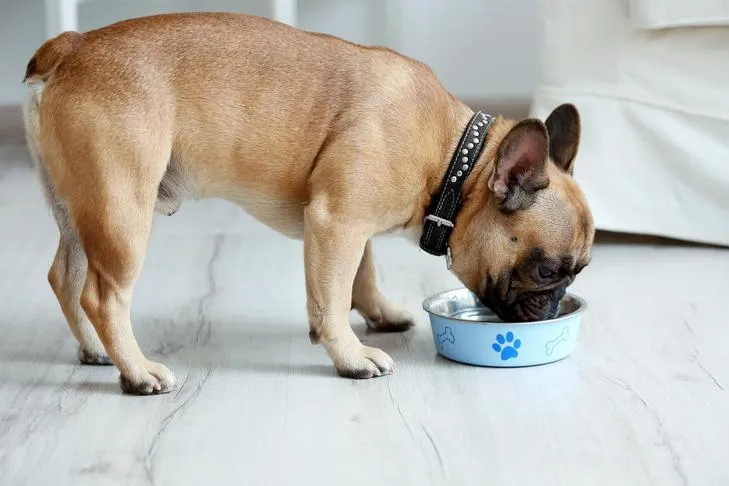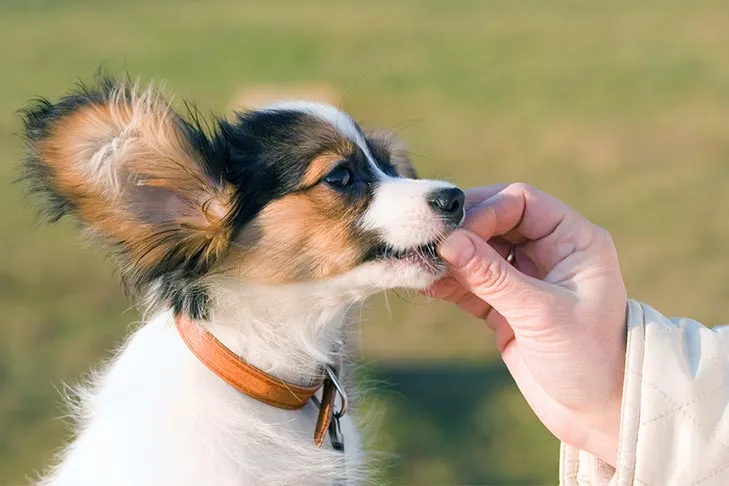As loving pet parents, we constantly seek ways to enhance our furry companions’ lives, and sharing meals can feel like a natural extension of that bond. However, it’s crucial to understand that not all human foods are safe or beneficial for dogs. While commercial dog food provides complete nutrition, offering certain human foods in moderation can be a delightful treat and even provide additional health benefits. Understanding What Are Things Dogs Can Eat safely is key to ensuring their well-being and preventing accidental harm. This guide from Dog Care Story will walk you through a variety of common human foods that your canine friend can enjoy, along with essential guidelines for safe feeding. what are some things dogs can eat to keep them healthy and happy?
Safe and Wholesome Human Foods for Your Canine Companion
Many ingredients found in our kitchens can be a healthy and exciting addition to your dog’s diet when prepared correctly and offered in appropriate quantities. Always introduce new foods slowly and observe your dog for any adverse reactions, such as an upset stomach. When considering what are things dogs can eat, always err on the side of caution and consult your veterinarian if you have any doubts.
Bread
Small quantities of plain, unseasoned bread are generally safe for dogs. It won’t offer significant nutritional benefits, as it primarily consists of carbohydrates and calories, similar to its effect on humans. It’s crucial that the bread does not contain any spices, garlic, onions, or especially raisins, which are highly toxic to dogs. Homemade bread is a better option than store-bought varieties, which often contain unnecessary preservatives. However, plain bread should be considered an occasional treat rather than a dietary staple.
Cashews
Cashews can be a delightful treat for your dog, but only in strict moderation. These nuts contain beneficial nutrients like calcium, magnesium, antioxidants, and proteins. However, despite being lower in fat compared to some other nuts, overfeeding cashews can contribute to weight gain in dogs. Ensure any cashews you offer are unsalted to prevent excessive sodium intake, which is detrimental to canine health. A few unsalted cashews here and there can make for a nice, crunchy reward.
Cheese
Most dogs adore cheese, and it can be a fantastic high-value treat when given in small to moderate amounts. Unless your dog has a rare lactose intolerance, cheese can be a safe option. However, many cheeses are high in fat, so opting for lower-fat varieties like cottage cheese or mozzarella is advisable to prevent digestive upset or weight gain. Many dog owners also find dog-specific dried cheese chews, like Himalayan dog chews, to be a popular and long-lasting treat for their pets.
 All American Dog resting its head on the kitchen table looking at cheese.
All American Dog resting its head on the kitchen table looking at cheese.
Coconut
This versatile fruit can offer several health benefits for dogs. Coconut contains lauric acid, which possesses antibacterial and antiviral properties. It’s also known to help alleviate bad breath and can be beneficial for certain skin conditions such as hot spots, flea allergies, and general itchy skin. Both coconut milk and coconut oil are safe for canine consumption. When feeding coconut, always remove the fibrous outer shell, as it can pose a choking hazard or cause intestinal blockage if ingested.
Corn
Corn is a common and perfectly acceptable ingredient found in many commercial dog foods. It provides carbohydrates for energy and some fiber. If you’re sharing corn from your plate, it’s absolutely vital to ensure it is completely removed from the cob. Corn cobs are indigestible and can cause severe intestinal blockages, requiring emergency veterinary intervention. Offering cooked corn kernels off the cob is a safe way to let your dog enjoy this vegetable.
Eggs
Fully cooked eggs are an excellent source of protein and can be very beneficial for dogs, especially those with an upset stomach. They are packed with essential amino acids and vitamins. However, it’s crucial to always cook eggs thoroughly. Raw egg whites contain avidin, an enzyme that can interfere with biotin absorption, potentially leading to a biotin deficiency over time. Scrambled, boiled, or poached eggs make a nutritious and palatable treat.
Fish
Certain types of fish can provide a significant health boost for your dog due to their rich content of good fats (omega-3 fatty acids) and amino acids. Salmon and sardines are particularly beneficial. Salmon is a powerhouse of vitamins and protein, supporting joint and brain health, while sardines offer easily digestible bones for extra calcium. For most fish, it is imperative to meticulously remove all tiny bones before feeding, as they can splinter and cause internal injury. Always feed fish fully cooked and cooled, and limit its intake to no more than twice a week to avoid potential mercury exposure from larger fish.
Ham
While a small piece of ham might be appealing to your dog, it’s not the healthiest option for regular consumption. Ham is typically high in sodium and fat, which can be detrimental to a dog’s health, leading to issues like pancreatitis or excessive thirst. An occasional, tiny, unseasoned piece is acceptable, but it should never become a continuous habit or a significant part of their diet.
 French Bulldog eating from a bowl at home.
French Bulldog eating from a bowl at home.
Honey
Honey is more than just a sweet treat; it’s loaded with beneficial nutrients such as vitamin A, potassium, calcium, magnesium, copper, and various antioxidants. Feeding small amounts of local honey can even help dogs with seasonal allergies by gradually introducing small amounts of local pollen, which may help build up their immunity. Beyond consumption, honey can also be used topically as a natural antiseptic for minor burns and superficial cuts on their skin.
Milk
Dogs can drink milk, but caution is advised. While many adult dogs enjoy milk, some are lactose intolerant and may experience digestive upset like diarrhea or gas. If you choose to offer milk, do so in very small quantities and monitor your dog for any signs of discomfort. For dogs that don’t tolerate dairy well, sticking to plain water is always the safest option for hydration.
Peanut Butter
Peanut butter is a popular and excellent source of protein for dogs, containing heart-healthy fats, vitamins B and E, and niacin. The healthiest option is raw, unsalted peanut butter. However, it is absolutely critical to check the label carefully to ensure the peanut butter does not contain xylitol. Xylitol is a sugar substitute that is highly toxic to dogs and can cause a rapid drop in blood sugar, liver failure, and even death. Always choose xylitol-free peanut butter. what is a good human food for dogs that also offers great nutritional benefits? Peanut butter, if carefully selected, certainly fits the bill!
Peanuts
Unlike almonds, plain peanuts are safe for dogs to eat in moderation. They are packed with healthy fats and proteins that can contribute positively to your dog’s diet. As with cashews, moderation is key to prevent your dog from consuming too much fat, which can lead to pancreatic issues. Always choose unsalted peanuts, as excessive salt intake can be harmful to their kidneys and overall health.
Popcorn
Unsalted, unbuttered, and air-popped popcorn can be an acceptable treat for your dog in moderation. It contains riboflavin and thiamine, which are beneficial for eye health and digestion, along with small amounts of iron and protein. It’s crucial to ensure all kernels are fully popped before offering them, as unpopped kernels can pose a significant choking hazard or cause dental damage.
Pork
Pork is a highly digestible protein source, rich in amino acids. While it contains more calories per pound than some other meats, it can be a good addition to a dog’s diet. Interestingly, pork may be less likely to cause allergic reactions in some sensitive pets compared to other common proteins. Always ensure pork is cooked thoroughly and free from excessive fat, skin, bones, and seasonings like onions or garlic, which are toxic to dogs.
Quinoa
Quinoa, a highly nutritious pseudocereal, is increasingly found in high-quality dry dog foods. Its robust nutritional profile makes it a healthy and often preferred alternative to common starches like corn, wheat, and soy, which are frequently used in kibble production. It’s a good source of protein, fiber, and various minerals, contributing to overall canine health.
 Samoyed puppy laying in the grass outdoors.
Samoyed puppy laying in the grass outdoors.
Salmon
As mentioned earlier, fully cooked salmon is an outstanding source of protein, beneficial fats, and amino acids. It actively supports joint health, boosts brain function, and strengthens the immune system. However, consuming raw or undercooked salmon is extremely dangerous for dogs because it can contain parasites that cause “salmon poisoning disease,” leading to severe symptoms like vomiting, diarrhea, dehydration, and potentially even death. Always ensure salmon is cooked all the way through, as this process eliminates the harmful parasites.
Shrimp
A few cooked shrimp can be a perfectly fine occasional treat for your dog, provided they are thoroughly cooked and all parts of the shell (including the tail, head, and legs) are completely removed. Shrimp are rich in antioxidants, vitamin B-12, and phosphorus, while being commendably low in fat, calories, and carbohydrates, making them a lean and healthy protein option.
Tuna
Dogs can consume tuna, but only in very small, controlled amounts. When offered in moderation, cooked, fresh tuna is an excellent source of omega-3 fatty acids, which are crucial for promoting heart health and good eyesight. For canned tuna, it’s important to be aware that it can contain small amounts of mercury and sodium. Therefore, a little bit of canned tuna prepared in water (not oil) and without added spices is acceptable as an occasional treat.
Turkey
Turkey is a safe and lean protein source for dogs, particularly beneficial if you remove any excess fat and skin from the meat. It’s also crucial to meticulously check for and remove all bones. Poultry bones are notorious for splintering during digestion, which can lead to severe issues like internal blockages or even tears in the intestines. Avoid feeding any turkey that has been seasoned with excessive salt, onions, or garlic, as these ingredients are toxic to dogs.
Wheat or Grains
Contrary to some popular myths, dogs do not necessarily need a grain-free diet, and grains like wheat and corn are perfectly acceptable for most canines. In fact, grains are valuable sources of protein, essential fatty acids, and fiber, contributing significantly to a balanced diet. However, if your dog has specific allergies that have been diagnosed by a veterinarian, it might be necessary to avoid certain grains. Always consult your vet for personalized dietary recommendations tailored to your dog’s individual needs and sensitivities. what are good things for dogs to eat often include these nutritious grains.
Yogurt
Plain yogurt is a perfectly acceptable and often beneficial snack for dogs. The active bacterial cultures in plain yogurt act as probiotics, which can help strengthen and balance a dog’s digestive system. However, like milk, some dogs may have difficulty digesting dairy products due to lactose intolerance. Always opt for plain yogurt with no added sugars or, more importantly, artificial sweeteners like xylitol, which are highly toxic to dogs.
 Papillon puppy gently taking a treat from a hand.
Papillon puppy gently taking a treat from a hand.
Understanding What Dogs Can’t Eat
While this guide focuses on human foods that dogs can eat, it is equally, if not more, important to be aware of the many common human foods that are dangerous or toxic for dogs. Some of these can cause mild digestive upset, while others can lead to severe illness, organ damage, or even be fatal. Always keep foods like chocolate, grapes, raisins, onions, garlic, avocado, xylitol, and macadamia nuts far away from your dog. If you suspect your dog has ingested something toxic, contact your veterinarian or an emergency animal hospital immediately. what can dogs eat and not eat is a critical distinction for every dog owner.
Conclusion
Understanding what are things dogs can eat safely from our own kitchens empowers you to offer healthy, varied, and exciting treats to your beloved pet. While commercial dog food remains the cornerstone of a balanced diet, incorporating small, vet-approved portions of human foods can enhance their nutrition and bring joy. Always prioritize your dog’s health by introducing new foods gradually, observing for adverse reactions, and strictly avoiding known toxic ingredients. For any concerns regarding your dog’s diet or specific health conditions, always consult with your veterinarian. This proactive approach ensures your furry friend enjoys a long, healthy, and happy life by your side.
